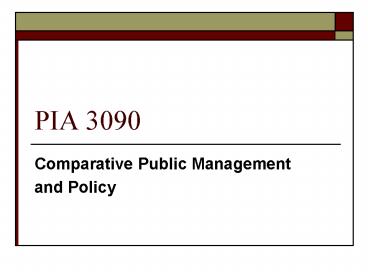PIA 3090 - PowerPoint PPT Presentation
Title:
PIA 3090
Description:
3. Harris- End of the Third World? End of. Development Budgets ... World Bank in Uganda- special salaries for those on contract with the project ... – PowerPoint PPT presentation
Number of Views:24
Avg rating:3.0/5.0
Title: PIA 3090
1
PIA 3090
- Comparative Public Management
- and Policy
2
PIA 3090
- Bureaucracies, Budgets and Decision-Making
3
The Main Event
- I. Golden Oldies
- II. Literary Map
- III. Grand Synthesis
4
Decision-Making and Budgets
- Themes and Definitions
5
Themes
- a. Budget Recurrent vs. Capital (Development)
Budgets - b. Financial Management- Incrementalism and
Satisficing vs. Zero Based Budgeting (Planning
Systems) - c. Accounting- Cost and Benefit vs. profit and
loss
6
Themes
- d. Auditing vs. Accountability-
Quantitative vs. Qualitative - e. Evaluating- Assessment vs. Judgement
- f. Budgeting Two themes- Reforming and
Decision-making
7
Decision-Making and Financial Management
- A Review of Themes
8
Decision-Making and Financial Management (Review)
- 1. Savas-Privatization and Contracting Out-
Commercialization and intra-governmental
competition - 2. Johnson- Economic Bureaucracy, Public Sector
Management A Japanese Model? - 3. Harris- End of the Third World? End of
- Development Budgets
9
Decision-Making and Financial Management
- 4. Heady- Imbalance- Political vs.
Bureaucratic Development in the role of financial
management (The Corruption Problem) - 5. Armstrong- Values, money and Development
Management - 6. Nelson- International Organizations, NGOs
and Development (Contracts vs. Grants)
10
Decision-Making and Financial Management
- 8. Turner and Hulme- Private Sector Development
vs. Development Management The role of public
sector financial management (Oversight) - 9. Peters and Barzelay-Public Sector Reform
- 10. Caiden and Wildavsky- Planning vs.
Budgeting - 11. Janis- Is Budgeting and financial
management impacted by Group Think?
11
Planning, Financial and Budgetary Management
Systems in Poor Counties
- Five historical periods-
- Read Caiden and Wildavsky
- Best Book on realities of Public Budgeting and
Development
12
Historical Periods Famous Five
- i. Until the 1950s- recurrent budgets- law and
order. - ii. 1950s-1960s- growth. Domestic development
Funds with bilateral technical assistance - Recurrent vs. Development budgets
- iii. 1960s-1970s Distribution and basic needs.
World Bank and Poorest of the poor
13
iv. Mid-1970s to mid-1980s Planning vs.
Budgets
- Planning demanded by technical assistance
- Technical assistance- both grants and loans (no
private loans to Africa - Project planning "wins" over national planning
and budgeting systems
14
v. 1980s- Structural Adjustment
- 1980s-End of century- Structural Adjustment
"non-budgetary" allocations vs. incremental
budgeting (define) - donor monies drive the system in the
degenerated state - Goal Back to the Future
15
Reforming Government Budgeting
- 1. Baker and Schroeder- reforming public
finance vs. privatization or devolution - 2. Naomi Caiden- Planning vs. Budgeting-
Incrementalism vs. Performance budgets - 3. Steve Arnold and Phil Morgan- Programs, plans
and projects (sustainability and the
Sustainability Issue)
16
Reforming Government Budgeting
- 4. Guy Peters- The nature of budgetary
decision-making- beyond politics? Should it be? - 5. Barzelay- What financial paradigms are
cliental oriented? - 6. Heady- Bureaucracy, Managing Budgets vs.
Political Development and Imbalance - 7. Hummel and Miewald- the importance (and
legitimacy) of criticism?
17
The Current State of Financial Management
- (Since 2001)- Structural Adjustment vs. Social
Crisis
18
The Current State of Financial Management
- 1. IMF Stabilization- currency reform, auctions
and trade liberalization - 2. Decentralized Budgeting- Part of Governance
Debate - 3. World Bank and UNDP "Management" - Opposing
views to SAPs
19
The Current State of Financial Management
- 4. Continued Absence of recurrent budgets and
loss of control in Crisis especially re. Terror
Prone, Collapsed and Fragile States - 5. Activity (economy) driven by technical
assistance projects - the only game in town - 6. Bridging and sectoral loans and grants-
major source of international involvement
20
Conditionality- What is the future?
- 1. Privatization of the economy
- a. divestiture
- b. contracting out
- c. liquidation
- d. sell off public private partnership shares
21
What is the Future?
- 2. Privatization (Commercialization) of the
bureaucracy - IN-SOURCING
22
Commercialization- Negatives
- a. Individuals work with investments and
the service/commercial sector - b. Departments sell their services- eg.
statistics in Zaire/DRC - c. Sub-economic salaries- offices and
telephones- buying soap and selling chickens
23
Commercialization- Negatives
- d. International conditions for "good"
bureaucrats, eg. World Bank in Uganda- special
salaries for those on contract with the project - e. Goal Return to the recurrent budgeting
process of the 1950s
24
Back to the Future?
- New Framework
- Subsidiarity and decentralized budgeting?































